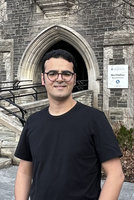Bio: Mohsen Bagherimehrab is a postdoctoral researcher working with Prof. Alan Aspuru-Guzik at the Departments of Chemistry and Computer Science. Mohsen is a member of The Matter Lab and he is broadly interested in the theory of quantum computing, particularly algorithmic quantum simulation and quantum complexity theory, and the intersection of these topics with physics and mathematics.
Mohsen completed his PhD in physics at the University of Calgary, advised by Barry C. Sanders, where he worked on algorithmic quantum simulation. Before that, he completed his M.Sc. in physics at Sharif University of Technology (Iran), where he worked on quantum error correction and fault-tolerant quantum computing.
CQIQC: Can you tell us about your particular area of expertise and what it entails?
MB: My research centers around the theory of quantum information processing, especially quantum computer algorithms for scientific computation with emphasis on practical applications. More specifically, I'm interested in developing algorithms that can run on a quantum computer to solve problems such as simulating quantum systems and differential equations, among others. Quantum computers are believed to outperform classical computers, and their development could be transformational for civilization, just like classical computers have been over the past decades. The outcome of my work could help answer questions such as what we can and cannot do with a quantum computer, both from fundamental and practical perspectives.
CQIQC: What kind of problems appeal to you?
MB: I’m generally attracted to problems at the intersection of quantum physics, mathematics, and theoretical computer science. Problems in quantum physics are counterintuitive and mathematically challenging, yet mostly have practical value. Problems in theoretical computer science have concrete statements and help to establish definite statements about the limits of computation and physical limits. Problems in quantum computing, particularly in quantum algorithms, sit in this intersection, making them more appealing to me.
CQIQC: What led you to be interested in this particular area, and how did it bring you to U of T?
MB: I’ve been interested in physics since high school; all my degrees are in physics. I became interested in quantum computation in my MSc, and my PhD was mainly involved with tools from theoretical computer science for algorithmic quantum simulation of quantum systems and quantum linear algebra problems. I then became very interested in theoretical computer science as well. Quantum algorithms encompass all these fields, so I became particularly interested in this area of research.
I came to U of T soon after my PhD defense to work with Prof. Alan Aspuru-Guzik. Alan’s group has been one of the leading groups in simulating chemistry on a quantum computer, particularly on noisy intermediate-scale quantum (NISQ) computers. My PhD work was mainly on fault-tolerant quantum algorithms for simulating quantum systems, so I found a perfect synergy in Alan’s group, where I can exploit my skills while expanding my research to other areas such as NISQ algorithms, machine learning, and domain knowledge on quantum chemistry simulation, the latter of which is often heralded as the killer application of quantum computers.
CQIQC: What are you currently working on? Do you see this as a largely theoretical pursuit at this time, or are there potential practical applications?
MB: Well, many different things! But most of them fall into the category of pushing the speed limits of digital quantum simulation and bridging the gap between theory and practice for quantum algorithms. While many remarkable quantum algorithms have been developed, they often come with certain limitations that hinder the utility of quantum computers for practical applications. In particular, these algorithms require access to certain complicated black boxes that specify a computational problem or make certain assumptions to obtain better asymptotic performance and, in most cases, give computational cost estimates that are overly conservative for practical applications. My work aims to establish new algorithmic techniques to remove these barriers in quantum algorithms and close the gap between theory and practical applications. Additionally, I am exploring the benefits and limitations of injecting classical randomness into quantum algorithms.
CQIQC: What would you say has been your career highlight to date?
MB: The highlight to me so far is that I’ve reached the stage that I can perform an independent line of research, from designing an original research agenda to executing it, and I’m happy to be in a place where I can work on topics I enjoy the most.
CQIQC: What are your hopes for the future?
MB: My hope is to continue expanding my research network and to establish an innovative research program.
CQIQC: Do any challenges loom especially large for researchers in your area?
MB: One of the biggest challenges in my area is to ascertain if and when quantum computers would have a clear advantage over classical computers.
CQIQC: Where do you think your research will take you next?
MB: I think my research will help to better understand the power of quantum systems in processing information, particularly in practical settings. This understanding will allow us to establish fundamental limits of computation and to probe fundamental theories in physics, ultimately leading to potential practical applications such as designing new pharmaceuticals and materials.

